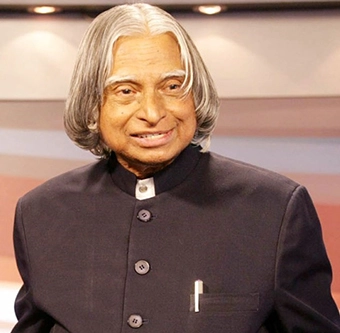Dr A. P. J. Abdul Kalam | 17 Oct 2022
For Prelims: Dr A. P. J. Abdul Kalam, PURA (Providing Urban Amenities to Rural Areas)
For Mains: Dr A. P. J. Abdul Kalam, Important Personalities
Why in News?
Recently, the Prime Minister paid tribute to the former President APJ Abdul Kalam on his 90th birth anniversary.
Who was Dr A. P. J. Abdul Kalam?
- About:
- Born on 15th October 1931 at Rameswaram in Tamil Nadu.
- His birth anniversary is celebrated as the National Innovation Day and World Students' Day.
- He graduated in Science from St Joseph's College, Trichy in 1954 and specialized in Aeronautical Engineering from Madras Institute of Technology (MIT) in 1957.
- He is one of the most distinguished scientists of India with the unique honour of receiving honorary doctorates from 48 Universities and institutions from India and abroad.
- He was sworn in as India’s 11th President in 2002 and completed the full term in 2007.
- He planned programmes to produce a number of successful missiles, which helped earn him the nickname “Missile Man of India”.
- Born on 15th October 1931 at Rameswaram in Tamil Nadu.
- Awards Received:
- He was awarded the coveted civilian awards - Padma Bhushan (1981) and Padma Vibhushan (1990) and the highest civilian award Bharat Ratna (1997).
- Literary Works:
- "Wings of Fire", "India 2020 - A Vision for the New Millennium", "My journey" and "Ignited Minds - Unleashing the power within India", "Indomitable Spirit", "Guiding Souls", "Envisioning an Empowered Nation", "Inspiring Thoughts" etc.
- Death:
- 27th July 2015 at Shillong, Meghalaya.
What has been the Contribution of Dr A. P. J. Abdul Kalam?
- His Contribution:
- Pioneer in Fiberglass Technology:
- He was a pioneer in fiberglass technology and led a young team to initiate this effort in ISRO from design, development leading to the production of composites rocket motor cases.
- Satellite Launch Vehicle (SLV-3):
- He made a significant contribution as Project Director to develop India's first indigenous Satellite Launch Vehicle (SLV-3) which successfully injected the Rohini satellite into Near-Earth Orbit in July 1980 and made India an exclusive member of Space Club.
- He was responsible for the evolution of ISRO's launch vehicle programme, particularly the PSLV configuration.
- Indigenous Guided Missiles:
- After working for two decades in ISRO and mastering launch vehicle technologies, he took up the responsibility of developing Indigenous Guided Missiles at the DRDO.
- He was the Chief Executive of Integrated Guided Missile Development Programme (IGMDP).
- He led to the weaponization of strategic missile systems and the Pokhran-II nuclear tests in collaboration with the Department of Atomic Energy, which made India a nuclear weapon State.
- After working for two decades in ISRO and mastering launch vehicle technologies, he took up the responsibility of developing Indigenous Guided Missiles at the DRDO.
- Technology Vision 2020:
- In 1998, he put forward a countrywide plan called Technology Vision 2020, which he described as a road map for transforming India from a less-developed to a developed society in 20 years.
- The plan called for, among other measures, increasing agricultural productivity, emphasising technology as a vehicle for economic growth, and widening access to health care and education.
- In 1998, he put forward a countrywide plan called Technology Vision 2020, which he described as a road map for transforming India from a less-developed to a developed society in 20 years.
- Medical and Healthcare:
- APJ Abdul Kalam in collaboratation with cardiologist B. Soma Raju designed a cost-effective coronary stent known as ‘Kalam-Raju-Stent’ for coronary heart disease which made healthcare accessible to all.
- The device led to reduction of prices of imported coronary stents in India by more than 50%.
- Light Combat Aircraft project:
- He was deeply involved in the country’s Light Combat Aircraft project.
- He had been associated with avionics. He also became the first Indian Head of State to fly a fighter plane. His first aeronautical project led him to designing India’s first indigenous hovercraft ‘Nandi”.
- A hovercraft is a vehicle that can travel over land, water, mud and ice by lifting itself off the ground with large blowers that create an air cushion beneath the craft.
- Others:
- He was passionate about bringing rural prosperity through PURA (Providing Urban Amenities to Rural Areas), in which science and technology has to play a key role.
- Based on his diverse experience he propagated the concept of World Knowledge Platform through which the core competencies of organizations and nations can be synergized to innovate and create solutions and products for the challenges of the 21st century.
- Pioneer in Fiberglass Technology:
UPSC Civil Services Examination, Previous Year Question (PYQ)
Q. “Where there is righteousness in the heart, there is beauty in the character. When there is beauty in the character, there is harmony in the home. When there is harmony in the home, there is order in the nation. When there is order in the nation, there is peace in the world.” – A.P.J. Abdul Kalam (2019)
Q. "If a country is to be corruption free and become a nation of beautiful minds, I strongly feel that there are three key societal members who can make a difference. They are father, mother and teacher." – A.P.J. Abdul Kalam (2022)

